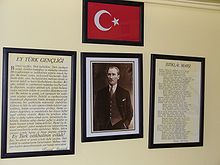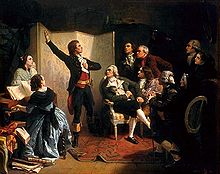- National anthem
-
For the Radiohead song, see The National Anthem."Patriotic song" redirects here. For songs known by the title "Patriotic Song" and similar, see The Patriotic Song.Instrumental performance of the Russian national anthem at the 2010 Moscow Victory Day Parade in Moscow's Red Square, resplendent with a 21 gun salute

A national anthem (also national hymn, song etc.) is a generally patriotic musical composition that evokes and eulogizes the history, traditions and struggles of its people, recognized either by a nation's government as the official national song, or by convention through use by the people.
Contents
History
Anthems rose to prominence in Europe during the 19th century, but some are much older in origin. The oldest national anthem is the "Wilhelmus", the Dutch national anthem, written between 1568 and 1572 during the Dutch Revolt, which became the official Dutch national anthem in 1932. The Japanese anthem, "Kimi ga Yo", has its lyrics taken from a Heian period (794-1185) poem, yet it was not set to music until 1880.[1] "God Save the Queen", the national anthem of the United Kingdom and one of the two national anthems of New Zealand, was first performed in 1745 under the title "God Save the King". Spain's national anthem, the "Marcha Real" (The Royal March), dates from 1770 (written in 1761). The oldest of Denmark's two national anthems, "Kong Christian stod ved højen mast" was adopted in 1780 and "La Marseillaise", the French anthem, was written in 1792 and adopted in 1795. Serbia was the first Eastern European nation to have a national anthem, Rise up, Serbia! in 1804.
An anthem can become a country's national anthem by a provision in the country's constitution, by a law enacted by its legislature or simply by tradition. The majority of national anthems are either marches or hymns in style. The countries of Latin America tend towards more operatic pieces, while a handful of countries use a simple fanfare.
Although national anthems are usually in the most common language of the country, whether de facto or official, there are notable exceptions. India's anthem, "Jana Gana Mana", is a highly Sanskritized version of Bengali. States with more than one national language may offer several versions of their anthem: For instance, Switzerland's anthem has different lyrics for each of the country's four official languages (French, German, Italian and Romansh). Canada's national anthem has different lyrics for each of the country's official languages (English and French), and on some occasions is sung with a mixture of stanzas taken from its French and English versions. The Sri Lankan national anthem has translated lyrics for each of the country's official languages Sinhala and Tamil. It was actually written in Sinhala, but a Tamil translation is also played on some occasions and mostly played in Tamil Provinces and Tamil schools. On the other hand, South Africa's national anthem is unique in that five of the country's eleven official languages are used in the same anthem (the first stanza is divided between two languages, with each of the remaining three stanzas in a different language). Apart from God Save the Queen, the New Zealand national anthem is now traditionally sung with the first verse in Māori (Aotearoa) and the second in English (God Defend New Zealand). The tune is the same but the words are not a direct translation of each other. Another multilingual country, Spain, has no words in its anthem, La Marcha Real, although in 2007 a national competition to write words was launched.[2]
Usage
 Schoolroom in Turkey with the words of the İstiklâl Marşı
Schoolroom in Turkey with the words of the İstiklâl Marşı
National anthems are used in a wide array of contexts. They are played on national holidays and festivals, and have also come to be closely connected with sporting events. During sporting competitions, such as the Olympic Games, the national anthem of the gold medal winner is played at each medal ceremony; also played before games in many sports leagues, since being adopted in baseball during World War II.[3] When teams from two different nations play each other, the anthems of both nations are played, the host nation's anthem being played last. The use of a national anthem outside of its country, however, is dependent on the international recognition of that country. For instance, the Republic of China (commonly known as Taiwan) is not recognized by the Olympics as a separate nation and must compete as Chinese Taipei; its National Banner Song is used instead of its national anthem.[4]
In some countries, the national anthem is played to students each day at the start of school as an exercise in patriotism. In other countries the anthem may be played in a theatre] before a play or in a cinema before a movie]. Many radio and television stations have adopted this and play the national anthem when they sign on in the morning and again when they sign off at night.
There may also be royal anthems, presidential anthems, state anthems, etc. for special occasions.
Certain etiquette may be involved in the playing of a country's anthem. These usually involve military honours, standing up, removing headwear etc. In diplomatic situations the rules may be very formal.
For parts of states
The Soviet Union and the United Kingdom, amongst others, are notionally held to be unions of many "nations" by various definitions. Each of the different nations may have their own "national anthem" and these songs may be officially recognized.
Fourteen of the fifteen republics of the Soviet Union had their own official song which was used at events connected to that republic. The Russian republic used the USSR's national anthem. Some republics retained the melodies of those songs after the dissolution of the USSR (see the article National anthems of the Soviet Union and Union Republics).
The United Kingdom's national anthem is "God Save the Queen" but its constituent countries also have their own anthems which have varying degrees of official recognition. England, Scotland, Wales and Northern Ireland each have a number of songs which may be played at occasions such as sports matches and official events. The song usually played for England is "God Save the Queen", though sometimes Jerusalem, I Vow To Thee, My Country, and Land of Hope and Glory may be played instead. Scotland has relatively recently adopted Flower of Scotland as its unofficial National Anthem, while Wales has sung Hen Wlad Fy Nhadau (Land Of My Fathers) since the 19th century and was sometimes accompanied by (or used on its own) the Hymn, "Guide Me O thy Great Redeemer", the use of which has been discontinued. Northern Ireland too has traditionally used "God Save the Queen" though Londonderry Air is also used.
In the Socialist Federal Republic of Yugoslavia, each of the republics (except the Socialist Republic of Bosnia and Herzegovina) had the right to its own national anthem, but only the Socialist Republic of Croatia had an anthem of its own, later joined by the Socialist Republic of Slovenia on the brink of the breakup of Yugoslavia. The Socialist Republic of Macedonia did not officially use an anthem, even though one was proclaimed during the World War II by ASNOM.
Czechoslovakia used to have an anthem composed from two parts, the Czech and the Slovak one. After the splitting of Czechoslovakia, Czech Republic adopted the first part as its own anthem, Slovakia adopted the second part with slightly changed lyrics and an additional stanza.
Although the United States has "The Star-Spangled Banner" as its official national anthem, each individual state also has its own state anthem and songs.
In Mexico, after the national anthem was established in 1854, most of the states of the Federation adopted local anthems, which often emphasize heroes, virtues or particular landscapes.
International organizations
Larger entities also sometimes have 'national' anthems, in some cases known as 'international anthems'. The Internationale is the anthem of the socialist movement, and the communist movement. Before March 1944, it was also the anthem of the Soviet Union and the Comintern. The tune of the Ode to Joy from Beethoven's Symphony No. 9 is the European anthem; the United Nations[5] and the African Union[6] also have unofficial anthems. The Olympic Movement also has its own anthem. Esperanto speakers at meetings often use the song "La Espero" as their anthem.
Creators
Most of the best-known national anthems were written by little-known or unknown composers such as Claude Joseph Rouget de Lisle, composer of "La Marseillaise" and John Stafford Smith who wrote the tune for "The Anacreontic Song", which became the tune for "The Star-Spangled Banner". The author of "God Save the Queen", one of the oldest and best known in the world, is unknown and disputed. Very few countries have a national anthem written by a world renowned composer, some exceptions are Germany, whose anthem "Das Lied der Deutschen" uses a melody written by Joseph Haydn and Austria, whose national anthem "Land der Berge, Land am Strome" was sometimes credited to Wolfgang Amadeus Mozart.
A few anthems have been composed by Nobel prize winners. India and Bangladesh adopted two songs written by the first Asian Nobel prize winner and noted Bengali poet/author Rabindranath Tagore as their national anthems, Jana Gana Mana and Amar Shonar Bangla, respectively. This is a very rare occasion where one person is the author of the national anthems of two different countries, if not unique. Nobel prize winner Bjørnstjerne Bjørnson wrote the lyrics for the Norwegian national anthem Ja, vi elsker dette landet. Other countries had its anthems composed by locally important people. This is the case for Colombia, whose anthem was composed by a former president and poet Rafael Nuñez, who also wrote the ancient constitution.
Modality
While most national anthems are in the standard major scale, there are a number of notable exceptions. "Hatikvah" (Israel), "Mila Rodino" (Bulgaria), "Nad Tatrou sa blýska"' (Slovakia), "İstiklâl Marşı" (Turkey), "Surudi Milli" (Tajikistan), "Azərbaycan marşı" (Azerbaijan), and "Meniñ Qazaqstanım" (Kazakhstan) are in a minor scale, while "Kimi ga Yo" (Japan), "Ee Mungu Nguvu Yetu" (Kenya), "Druk tsendhen" (Bhutan), and "Sayaun Thunga Phool Ka" (Nepal) use pentatonic scales. "Ey Iran" (Iran, unofficial) uses the Phrygian mode (known in Middle Eastern music as a variety of maqam kurd) and Garaşsyz, Bitarap Türkmenistanyň Döwlet Gimni (Turkmenistan) uses the Mixolydian mode. The national anthem of South Africa and Il Canto degli Italiani (Italy) do not end in the same key in which they start.[7][8] The Afghan National Anthem uses parallel key modulation.
See also
References
- ^ Japan Policy Research Institute JPRI Working Paper No. 79. The Indian National anthem "Jana Gana Mana" was transcribed from a poem by Rabandrinath Tagore. Published July 2001. Retrieved July 7, 2007
- ^ "Spain struggles for a new anthem". The Economist. July 26, 2007.
- ^ "Musical traditions in sports". CNN. http://sportsillustrated.cnn.com/multimedia/photo_gallery/0711/music.traditions.sports/content.3.html.
- ^ Yomiuri Shimbun Foul cried over Taiwan anthem at hoop tourney. Published August 6, 2007
- ^ "Does the UN have a hymn or national anthem? Fact Sheet # 9". United Nations Organization. http://www.un.org/geninfo/faq/factsheets/hymn.pdf.
- ^ African Union AU Symbols.
- ^ "Italy: Il Canto degli Italiani". NationalAnthems.me. http://nationalanthems.me/italy-il-canto-degli-italiani. Retrieved 2011-08-08.
- ^ "South Africa: National Anthem of South Africa, Die Stem van Suid-Afrika/Nkosi Sikelel' iAfrika". NationalAnthems.me. http://nationalanthems.me/south-africa-die-stem-van-suid-afrika-nkosi-sikelel-iafrika. Retrieved 2011-08-08.
External links
- AllTheNationalAnthems lyric and midi of all national anthems: free download!
- szbszig.atw.hu lyric and vocal of national anthems every countries
- national-anthems.net lyric and instrumental of national anthems every countries' around the world
- Nationalanthems.info, lyric and history of national anthems every countries' around the world
- Nationalanthems.us, online forum on lyrics, sheet music and links of national anthems
- Cuban National Anthem Website Cuban National Anthem interpreted by Cuban artists with music and voice.
- Recordings of countries' anthems around the world by the US Navy band
Categories:- National anthems
- Anthems
Wikimedia Foundation. 2010.


